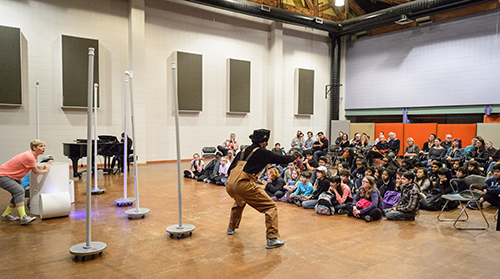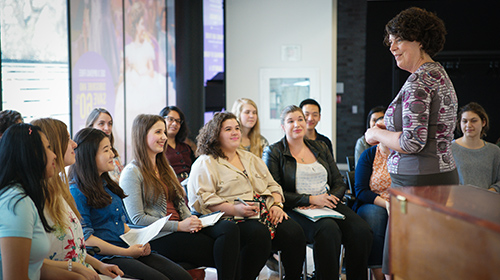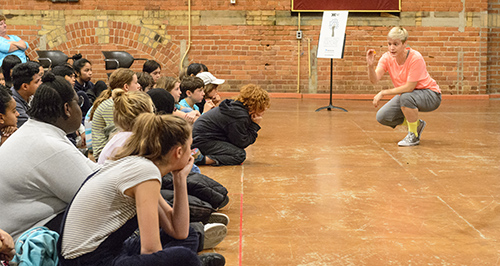-
Access to Opera: Making it Simple
By Tanner DaviesPosted in EducationFeaturing Lauren Eberwein, COC Ensemble Studio Member

The Canadian Opera Company prides itself on its commitment to breaking down barriers to opera across all age groups: children can create their own operas with the Scotiabank After School Opera Program and Scotiabank Summer Opera Camps; youth can speak directly with artists and attend rehearsals through Youth Opera Lab; workshops and tours go directly into schools; and adults can connect with opera on another level through Opera Insights, Pre-performance Opera Chats, and Opera Talks. In addition, Opera Under 30, presented by TD, offers opera lovers under the age of 30 tickets to mainstage productions for $22.
Without education and outreach programs like these, your favourite singers might not have discovered their love of opera. We recently spoke with rising star and COC Ensemble Studio member Lauren Eberwein about her initial experience with this art form, as well as opinion on how to make opera fun and accessible.
What was your first experience with opera like? What was the opera that really hooked you on the art form?
The first opera I experienced live was Rossini’s The Barber of Seville with my junior high music class. Honestly, I can’t say I immediately connected with the art form. I loved the music but still felt at a distance. At that time I was making music in choir, band and orchestra, but I hadn’t yet connected with operatic vocal music. I sang, and had witnessed plenty of singing, but never like that. Opera singing really is otherworldly, and I think as a young person, even more so. The scale of the art form can isolate young audiences. There are a lot of barriers for a young person to overcome in order to sincerely connect with the art form. So, in all honesty, my first experience didn’t hook me.
I didn’t truly get the opera bug until I joined a youth opera program called "Project Opera" when my family moved to Saint Paul, Minnesota. I spent every Saturday afternoon singing with my peers. It was a safe haven of music and theatre geeks exploring this grand art form together. We spent our weekends sharing the joy of singing and telling stories through music.

How do you think young people can/should be introduced to opera?
The first hurdle young people face is the barrier of actual access. Most opera companies are doing their best to increase access for kids: afternoon matinees for students, youth opera programs, community engagement programs, school tours, and so on.
But before we get their butts in the seats, music education is vital. Educators can inspire, interest, and expose young people to the complexity and grandiose nature of opera before they witness it in person. This is imperative—especially for young audiences. Opera demands a lot from a youthful audience: they must process complex orchestral scores, operatic vocal technique, foreign languages, costumes, plot, set, lighting, etc. It’s what makes opera the most all-encompassing live art form—but can also be a lot for a young mind to process—and I believe when we overload them they are more likely to shut down. If the art form can first be distilled in classrooms, young people are then better able to receive it when they visit the theatre.
I also believe a lot of the barriers could be deconstructed by an awareness in the performer. Kids are open and often really eager to learn. The majority of young people are totally game to jump headfirst into the mystery that is opera—but we have to give them an entry point. We must perform with them in mind. Sing to and with them, not at them.
The COC’s 2016 Ensemble Studio School Tour of Matthew Aucion’s Second Nature is a perfect example. The piece is brand new, sung in English, and the narrative follows the journey of two kids who leave the safety of their artificial habitat and work to heal the planet. It’s set in a post-apocalyptic future that could very well become reality for a future generation, and the kids immediately understood this. And everywhere we went we encountered bright young minds, with astonishingly astute insights.
I believe it’s our job as performers to approach every piece with absolute trust in its ability to inspire. If we fearlessly dive into a piece and share it as our truth, we better invite our audience to join us on the adventure. I find that with kids this is even more important, and the reward is even greater.

How are opera stereotypes incorrect?
Opera is not an art form exclusively for the rich elite. In fact, most new opera goers are young people. Opera can be expensive, but so can a pop concert, and there are almost always rush tickets, student discounts, and package deals at the opera. I’m relatively new to Toronto, but I already know that this city has opera coming out of its ears. The indie opera scene here is like none other—young companies are sprouting out of the woodwork and creating truly awe-inspiring and innovative work. It’s accessible, affordable, and it’s everywhere!
How has being a fan of opera changed your life?
Opera gives the gift of feeling emotion on the grandest of scales, and in the depths of your being. When I experience emotion at the opera, I feel it in the marrow of my bones. I go to the opera to be powerfully and colourfully inspired.
 Bronwen Sharp.jpg)
Qualicum Beach, BC native Lauren Eberwein placed second in the Canadian Opera Company’s Ensemble Studio Competition in 2016. She studied at the Curtis Institute of Music and was a member of Opera Philadelphia’s Emerging Artist Program. Her credits include Baba the Turk in The Rake’s Progress, The Composer in Ariadne auf Naxos, Zita in Gianni Schicchi, Tisbe in La Cenerentola, Mère Marie in Dialogues des Carmélites, Second Lady in The Magic Flute, and Dido in Dido and Aeneas (Curtis Opera Theater); Sorrel and Dodo in Double Exposure, Olivia in Cold Mountain and Clairon in Cappriccio (Opera Philadelphia). She made her Carnegie Hall debut singing Handel's Israel in Egypt with the New York Choral Society. This season with the COC she sings the role of Wellgunde in Götterdämmerung.
Photo credits (top - bottom): Lauren Eberwein and Iain MacNeil in Second Nature (COC, 2016), photo by Chris Hutcheson; Wendy Nielsen and participants of a Youth Opera Lab; Lauren Eberwein in Second Nature (COC, 2016), photo by Chris Hutcheson; Lauren Eberwein, photo by Bronwen Sharp
